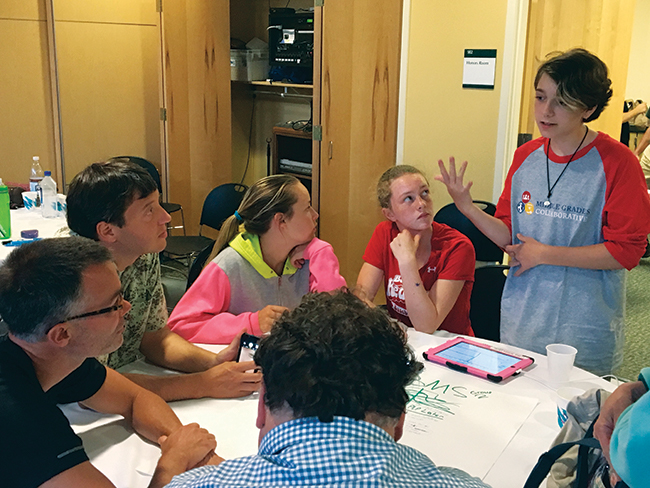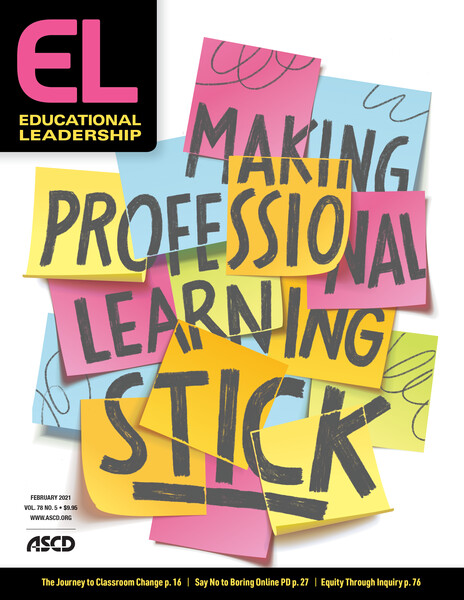As former middle school teachers, we are familiar with an old joke about teacher professional development where one educator says to another, "I hope I die during inservice … because the transition will be so subtle." Fortunately, most education leaders now know that changing teacher practice requires professional development that incorporates active learning, modeling, and collaboration; focuses on content; and provides sustained opportunities for coaching, feedback, and reflection (Darling-Hammond, Hyler, & Gardner, 2017).
But what compels teachers to not only change their practice, but also stick with the improvements over the long term? From running a week-long institute for educators for almost three decades now, we've learned that there's often one thing missing from most professional learning sessions that can significantly improve them: students. Student voice can be a significant contributor to a climate of professional learning. Lasting change comes from the heart as much as the head, and nothing speaks more to the heart than students themselves.
The Middle Grades Institute (MGI) is an intensive week-long summer program for teachers that places student voice at the center of teacher learning. As the MGI's co-directors, we convene between 150–200 educators annually on a Vermont college campus to improve teaching and learning for young adolescents. While most of the participants in our institute historically have come from Vermont, educators from across the nation, such as North Dakota and Washington D.C., and the globe, including British Columbia, Guatemala, and Saudi Arabia, have begun attending to advance their practice. Designed by the Middle Grades Collaborative, which is a unique collaboration of four colleges and universities, the MGI gives teachers the opportunity to identify their own goals for the week; to chart personal learning plans toward those goals; and to engage in collaborative and independent learning to improve their practice.
A key part of the MGI program is that participating educators get to work directly with middle school students. We ask school counselors from three or four local schools to nominate students between the ages of 10–14 whose identities, such as BIPOC, low-income, and first-generation, are often underrepresented in higher education. These 25 students spend the week on campus with the teachers. They spend half of each day engaged in a program designed specifically for them, aimed at career exploration and promoting postsecondary career and college success. During the other half of the day, the middle schoolers serve as experts on early adolescence. The teachers consult with the students on a range of topics, including the students' lived experiences of school, their development, their social identities, and their academic engagement.
These learning sessions take many forms and depend largely on teachers' goals and priorities. In the small group consultation model, for example, teachers meet with small groups of students to present ideas for lessons, projects, and units and receive feedback on what resonates and what doesn't. In the co-experimentation model, the students join teachers to help them try out a new strategy that teachers might be reluctant to try with their own students. For example, students and teachers may experiment with building a collaboratively designed curriculum, enabling teachers to practice the student-driven approach before introducing it in the upcoming school year in their own classrooms. In the student panel model, students sit on panels, responding to educators' questions and allowing teachers to hear student perspectives on topics such as fair and equitable assessments, remote and online learning conditions, classroom and school governance, and LGBTQ experiences.
Over the past two decades, students have reported really enjoying the consultations. When asked about the experience, one young adolescent offered, "I think that the teachers here are actually very nice. I feel like I'm not talking to an educator. I feel like I'm just talking to someone about things that interest all of us so we can get more of our views out." Another similarly observed, "It was fun teaching something for once instead of listening, like I was the one that was teaching, and they were listening to me!" These insights reveal the kind of shift in power dynamics that can develop when students are acknowledged as experts.
Middle-schoolers consult with teachers at theMiddle Grades Institute in Vermont.(Photo courtesy of Middle Grades Collaborative)
Lasting Changes in Teacher Practice
After the MGI has concluded, many teachers come to recognize the value of students' perspectives and invite their own students to help them grow as professionals. Here are a few examples of how student consultancy has resulted in lasting changes to teacher practice. In each case, the opportunity to hear directly from students presents educators with a new professional learning paradigm, one that places students at the center of teacher learning.
Providing Ongoing Feedback
When Don Taylor, a humanities teacher at Main Street Middle School in Montpelier, Vermont, first consulted with students at the MGI, he invited feedback on his use of formative and summative assessment. When he saw how helpful the consultation was, he realized he could use student feedback not only to assess their comprehension of his lessons but also to evaluate how well he scaffolded their learning. Now, several years after that initial student consultation, Don regularly surveys his own students during units to find out how they're engaging with the resources and if he's providing them with "the breadcrumbs they need to get from point A to point G." At the end of a unit, he asks students for input on the summative assessment, to evaluate if he provided students with sufficient time and opportunities to master the proficiencies or standards. Don collects this feedback, engages the class in discussion about it, and applies his learning to future practice.
Emergency Problem Solving
When the COVID-19 pandemic forced Middlebury Union Middle School in Middlebury, Vermont, to shift to remote instruction, teacher Evy Gray had already established a Student Planning Committee (SPC) as a result of her first MGI experience. The group served as a critical resource for the entire middle school teacher team during that abrupt change, and they were eager to help shape how they learned remotely by giving feedback on assignments, meetings, forms of technology, and other areas. At the most recent MGI, Evy brought several of the SPC students with her. They used their consultation time to plan how the SPC would hit the ground running if schools needed to once again operate remotely in the new year. Because of the SPC's prior successes, Evy now uses the committee to assist her in planning the curriculum.
Changing Schoolwide Pedagogy
Educators at Shelburne Community School in Shelburne, Vermont, wanted to improve the school's personalized learning plan template. In an effort to make the plan uniform and easily implementable, the educators had imposed structures and systems they thought were student-centered. However, through a series of consultations at the MGI, students helped them see how the plan had been, in their words, "teacher-fied," with student voice largely having been omitted in the planning process. Teacher Meg O'Donnell and her colleagues invited a group of students from their school to join them at the MGI for one afternoon specifically to consult on the personalized learning plan redesign. Meg explained, "The students essentially said, 'You want us to capture our personalized learning? Give us opportunities to personalize our learning!'" After that experience, the teachers continued the student consultations into the fall back at their school. The students advised more hands-on projects, more time during school to work on those projects, a choice in the platform of their learning plan, and an authentic audience to share their learning with. The consultations resulted in a shared commitment to embed those four features in the school's personalized learning plan process going forward. Over the course of the subsequent academic year, this team of teachers and students co-constructed a much-improved system. Students were positioned to choose the platform and select which projects to include in the personalized learning plan. Students also had opportunities to present their plans to their families and other significant adults at student-led conferences.
Co-Constructing Curriculum
Having learned from the MGI student consultants over several summers, Sam Nelson, also a teacher at Shelburne Community School, was inspired to co-plan the curriculum with his students during the school year. He now offers weekly meetings where all students are invited to participate in the curriculum design process, combining the non-negotiable elements, such as standards or proficiencies, with students' hopes, ideas, and interests. This Student Planning Committee serves as a way to leverage student curiosity, interest, and knowledge to improve the engagement and effectiveness of the class's learning opportunities. Sam explained, "Everything is better now that, instead of telling students what to do, I'm asking them how we might do it."
Getting Started with Student Consultancy
How can educators integrate student consultancy into their schools' professional development programming? The teachers above each had the advantage of experiencing student consultancy at the MGI before employing the strategies with their own students. In the many years that MGI has brought students to the professional development table, we've learned a few important things about the process (Downes, Bishop, & Nagle, 2017).
Student consultancies are most effective when teachers:
Set the tone. Make it clear to students that they value the expertise and experience that students possess. They honor and strive to learn from all students' experience, and especially those with whom they may not share social, cultural, or other identities.
Clarify the purpose. Teachers need to be transparent about their reasons for eliciting students' input. They should be honest about what they're struggling with, curious about, or need feedback on. The more explicit teachers make their questions and needs, the more useful the feedback they receive. The best questions provide detailed scenarios of what the teacher is trying to do (such as creating an integrated unit on river restoration or developing a literacy intervention program), and asking open-ended probing questions so that students can provide their honest opinion without feeling there is a correct answer.
Try different models. Be aware that some feedback may be well-suited to face-to-face interaction with students, while other input may be better sourced anonymously. Teachers benefit from trying a variety of models, from straightforward panels and focus groups to more complex co-experimentation. Student panels and focus groups are a good choice when teachers are just beginning to envision a change. Teachers often find it helpful to hear what students think and feel about an idea before delving into it. In contrast, once teachers have a more concrete project, unit, or strategy in mind, inviting students as co-experimenters allows for a low-stakes feedback loop that provides teachers with valuable suggestions from students.
Be conscious of power dynamics. Ensure that students generally outnumber the educators in the consultancy. Partnering two teachers with a group of three to five students, for example, enables students to build on their ideas while providing teachers with varied perspectives. This approach can also reinforce the dynamic of speaking with students rather than at them (Cook-Sather, 2015).
Act on their new learning. Convey to students that their expertise is not only welcome but also taken seriously. Teacher Meg O'Donnell advised, "You need to show that you value their input by incorporating it into your practice. If you ask for their input and then don't do anything with it, they will see right through you. Claiming we honor student voice means we need to uphold our commitment to learning from students and acting on it."
Inviting student feedback on teacher practice positions student voice as a valid and valuable contribution to professional development. At the same time, it helps educators grow accustomed to asking for and attending to those important insider perspectives. The past few decades have convinced us that learning from students—the primary stakeholders in this business of schooling—is a powerful strategy for sustained educator learning. It extends the potency of professional development from inservice day to every day.
Student Perspectives on Student-Led PD
What do the students who lead professional development sessions want teachers to know? What do they get out of these sessions? Educational Leadership asked two recent high school graduates, Teyonna Campbell and Zoe Gosselin, about their experiences leading workshops for teachers. Through an opportunity with a school club they were members of, the two teens presented at schools and conferences to Massachusetts- and Connecticut-area educators when they were juniors and seniors in high school.
Why were you interested in leading professional learning sessions for teachers? What did your sessions look like?
Zoe Gosselin: I ran workshops about making educational spaces safe for LGBTQ+ students. Some of the workshops took the form of a panel discussion, with a small group of students giving a short presentation and then taking questions. I was interested in doing these workshops because I felt it was important for teachers and staff to be aware of the needs of their LGBTQ+ students. It is important for teachers to have open communication with their students, especially when it comes to discussing needs of a minority group that the teachers are most likely not a part of. It helps them to become more aware of how to create a safe and accepting environment in their classrooms.
Teyonna Campbell: The workshops I facilitated were based mostly around working with troubled students—basically the students who are most likely to be kicked out of class at least twice a week, the students that have a hard time or a different mindset about the way they want to be treated or talked to.
During these workshops, I opened up about my own struggles with depression, and why that was part of the reason for me being labeled the "difficult" student in class. It was an uncomfortable moment for me, but I felt like it could help teachers get an understanding of situations and why a student might act or feel a certain way.
What did you want teachers to take away from your presentation?
TC: That they aren't bad teachers, but not every student learns the same way. Every student has likes and dislikes. Every student has their best way of learning and not so best way of learning and to basically just get to know each one of your students as best as you can. Making a relationship with students makes stuff a lot easier for both sides.
What was the experience like for you personally?
ZG: I enjoyed the experience a lot. I felt the attendees responded well and took away a lot of information, so I felt accomplished and excited to see how the new information would be implemented in their schools.
TC: I felt like I was heard and understood. Some of the teachers who had participated in the workshop were teachers I had for classes in the past, and it made me feel a sense of comfort because I knew they understood me and seen how I had changed. I really enjoyed putting the workshop together, and everyone loved it. Sometimes I wish I could go back to senior year just to do it one more time before I graduated.
What advice would you give to teachers attending a student-led PD session?
ZG: Keep an open mind. By fully considering the information brought to them by students, they can get a better grasp on what needs to change within their own classroom.
TC: Listen, listen, LISTEN! Take a step back and let students teach you something that you can take away for the long run. Remember students have a mind, too, and just like teachers, we want a peaceful and positive environment.








